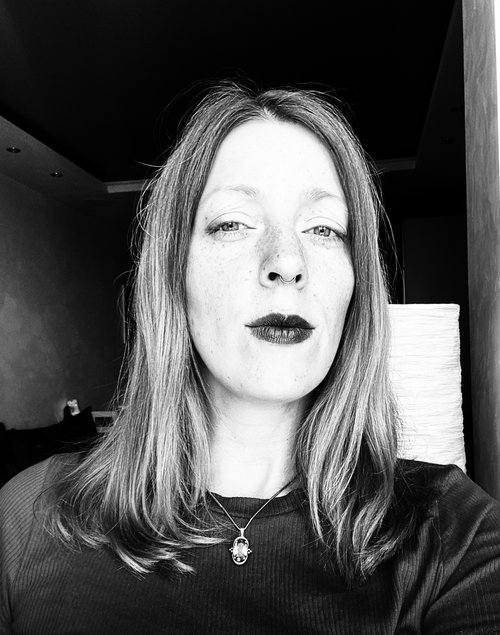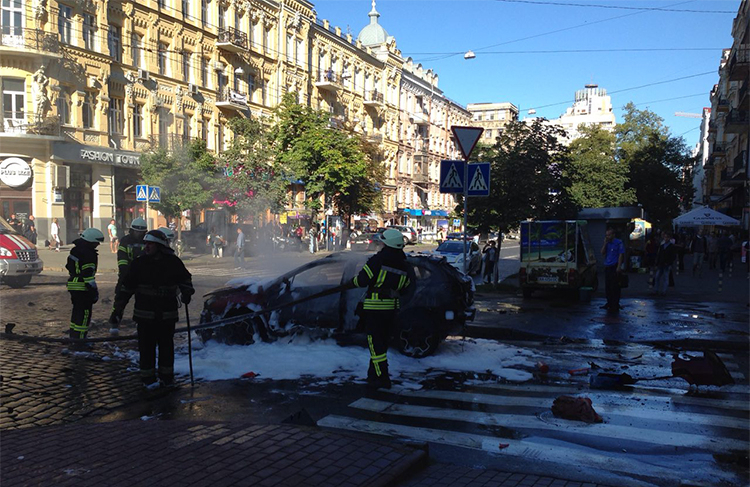Three times Russian journalist Ekaterina Sergatskova had to flee: first from Russia, then from Crimea and now from Ukraine. Her last flight was caused by threats after she published a story about the links between Ukrainian neo-nazi's and the wellknown post-Maidan fact-checker StopFake. In this column, published by openDemocracy, she warns the West that overcoming dictatorship doesn't automatically mean that democracy will blossom.
 Ekaterina Sergatskova
Ekaterina Sergatskova
by Ekaterina Sergatskova
I was forced to flee my home country a few months ago. For the outside world, it’s not easy to explain why. The country is Ukraine, a democratic state that went through a revolution six years ago, and is still fighting a bloody war started by Russia.
Indeed, Ukraine offers an important warning for other states in the midst of pro-democracy movements: safeguarding freedom of speech after the revolution is critical for its eventual success.
Overthrowing an autocrat does not mean that everything will be fine in the country that threw him out. What western institutions involved in democracy building should take into account is that after the fall of autocratic regimes, the problems are far from over - on the contrary, it’s just the beginning of a new struggle, and it’s even harder.
The West has to realise: after the fall of autocratic regimes, the struggle for democracy becomes even harder
After the 2014 revolution, Ukraine created specialised anti-corruption bodies, and reforms followed in other sectors, including healthcare and education. The country received billions in western money aimed at reforms, military improvement and civil society development. In 2017, the Association Agreement between the European Union and Ukraine, which had been negotiated during 2007-2011 and signed in 2014, finally entered into full force.
So, one would think that everything is fine with Ukrainian democracy. But it’s not.
Ukrainian neo-nazi's
In July 2020, Zaborona media, an outlet I co-founded in 2018, published the article 'Neo-Nazi links of a Facebook fact-checker exposed'. My team raised a controversial and important question: is it ok when two well-known members of a highly trusted fact-checking organisation' [StopFake, one of the first post-Maidan Ukrainian institutions that systematically started tackling Russian disinformation - ed.], which became a Facebook partner earlier this year, are friends with prominent Ukrainian neo-Nazis? [Facebook cooperates with StopFake to block Russian disinformation about Ukraine - ed.]
Especially when a significant part of Russian propaganda and 'justification' for attacking Ukraine was based on the idea that 'there is rampant fascism in Ukraine'. If you are a fact-checker, you have to tackle this kind of disinformation. But if people in your organisation have friendly relationships with real neo-Nazis, would it be fair to be involved in such an important process as fact-checking?
I always looked at these people [of StopFake - ed.] as agents of democracy, agents of positive changes who are fighting the information war against Russia – and I thought that they should not allow themselves to pursue an agenda. It turned out that for them this is the norm.
Kremlin agent
Asking this question was like a bomb going off. Many civil society activists who went through the Maidan revolution started labeling me a 'Kremlin agent'. Fact-checkers from the StopFake organisation released a statement in which they falsely accused Zaborona of continuing a pro-Kremlin attack on them. Many of them claimed that journalists shouldn’t damage the reputation of the fact-checkers. One popular Ukrainian TV anchor published several Facebook posts with death threats against me, as well as my home address and pictures of my son. I informed the police about it.
 Firemen extinguish the fire after Pavel Sheremet's car exploded in Kyiv. The journalist was killed.
Firemen extinguish the fire after Pavel Sheremet's car exploded in Kyiv. The journalist was killed.
But the police didn’t react. On the contrary, the Kyiv police spokesperson told us that they deal with these kinds of cases every day - we shouldn’t be worried. The police opened an investigation a month after I filed a complaint, when a local court ordered them to do so. The reform of Ukrainian law enforcement was launched back in 2015 with great fanfare. Georgian reformers under the command of former Georgian president Mikheil Saakashvili and with the support of western donors introduced substantial changes into the system. But soon enough, the Interior Minister started to sabotage the ongoing reform – and by the end of 2016, the Georgian team had to quit.
Fighting for democracy is a fight between dozens of shades of grey
The reform of Ukraine’s law enforcement failed, as well as the fight against corruption. A series of murders followed: journalist Pavel Sheremet was killed in the centre of Kyiv, and it is still unclear who was behind the murder. Activist Kateryna Handziuk died from an acid attack. Dozens of civil activists were assaulted in 2018, and hundreds more since then. All this has radicalised civil society activists, bringing them out onto the streets. And now, after Volodymyr Zelensky was elected president and a new parliament was formed, violations continue. Even Interior Minister Arsen Avakov remains in his post, despite huge civil society discontent and unsolved crimes against activists and journalists. This is the reason why I had to flee my country.
Fighting for democracy doesn’t mean a fight between good and bad. It’s a fight between dozens of shades of grey. It’s a fight between those who defend human rights and those who justify violations by citing the ongoing war; between those who debunk misinformation and those who spread propaganda; between those who investigate corruption and those who defend the crooks, because they have an excuse why this corruption needs to be tolerated. I don’t give any examples intentionally because sometimes people from that list do contradictory things. It’s that complicated.
Forced to flee Russia
Originaly born in Russia, I worked in a local newspaper that was brave enough to publicly oppose Putin's regime. One day, I noticed that an FSB agent was following me. After some threats, my newspaper was shut down and I was forced to flee Russia - I could no longer see how it was possible to live in the country. I moved to Crimea in 2008, where my family had lived since the 2000s. Ukraine became my new home. Some years after, I saw how Russian troops invaded Crimea, and I was forced to flee my home again. It was a strange feeling when some people started to accuse me of being a 'Russian sleeper agent'. Some of them highlighted the fact that I am Jewish.

Logo van de fact checker StopFake
Sometimes, I look at Georgia. A country that is similar to Ukraine, and has chosen the pro-democratic, pro-European path. Georgia was attacked by Russia too. They implemented successful reforms in many spheres, but still there are issues that compel citizens to leave the country. For instance, young people are subject to assaults and online bullying by anti-LGBTQ movements. There are informal anti-gay patrols in the country. And now during the parliamentary election campaign, people go through violations of human rights and attacks on the press.
Now hundreds of people have to flee Belarus. Westerners don’t ask why. It is a well-known fact that a dictator is still in charge. But when (not 'if') Belarus ousts the last European dictator, the country will face the same issue. The struggle for democratic values will begin, and it will be hard as hell.
This column was first published by openDemocracy.
